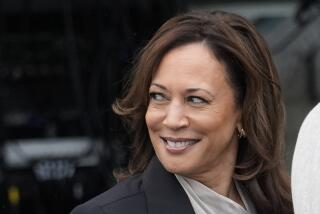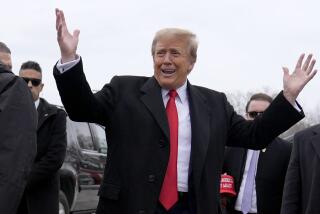Bush Campaign Looks to Power of Presidency : Election: Polls and staff problems overshadow the advantages of being the current officeholder. That stature will be hard for a challenger to match.
WASHINGTON — As he formally declares his candidacy today, President Bush’s reelection prospects may be far sunnier than his recent drop in public opinion polls, confusion within his campaign organization and missteps by the White House staff would suggest.
His position remains far from enviable. But as waves of turmoil wash over the surface of his campaign, they have obscured the advantages that accrue to the holder of the most powerful office in the land.
As President, Bush brings to the race an enormous campaign war chest, government funding of much of his travel and an army of prominent officeholders ready to campaign across the country at his command. Perhaps more important, he carries a stature nearly impossible for a challenger to match.
“The presidential seal is worth a great deal of political leverage,” said veteran Republican pollster Richard B. Wirthlin.
As a Republican, Bush benefits further from state-by-state voting patterns that for the last 40 years have given his party a consistent base of support worth roughly 80% of the 270 electoral votes needed to win in November.
He also can draw on a new crop of voters inclined to support Republicans regardless of their registration. Those numbers have caught up with Democrat-inclined voters after being outnumbered nearly two to one as recently as 1980.
At this early stage in the race, much remains unsettled and the economy is still Bush’s major problem.
Polling has consistently shown that, lacking a foreign crisis, bread-and-butter issues matter most to voters in presidential elections. If voters are not convinced by autumn that the economy has turned around, Bush could very well face an insurmountable obstacle.
Polls show Bush’s job approval rating has dropped to about 45%. And with 78% of those polled convinced that the nation is on the wrong track--a level not seen since 1979--the President “is swimming against the tide of history,” said Democratic pollster Mark Mellman.
Some experts say a perceptible economic rebound likely will be necessary to change those poll numbers. But most forecasters predict no more than slow economic growth, raising Republican concerns--and Democratic hopes--that the advantages of incumbency may at last be outweighed.
“Very few presidents have been down this far this late,” said Mellman.
Still, such poll figures are considered among the most volatile indicators of public moods, subject to frequent and large shifts. And while those currents may now be running the wrong way, it is far from clear that they can nullify a President’s advantages.
With nearly nine months to go before Election Day, key members in Bush’s campaign and his White House maintain an optimism that contrasts sharply with the recent blight of bad news.
As they look ahead, Bush’s campaign aides draw hope from the absence so far of a strong Democratic rival, and from the President’s success just four years ago in storming back from a 17 percentage-point midsummer deficit in the polls to win a landslide election.
Bush already has looked to his incumbency for a boost in his primary election battle against Patrick J. Buchanan, speaking to New Hampshire voters from the Oval Office in a television advertisement his advisers believe has been his most effective to date.
The historic set and an aural backdrop of patriotic music served as a reminder of past Bush triumphs and sent a not-so-subtle reminder to supporters of the upstart Buchanan that this is an election in which the presidency and all its glories are at stake.
With such benefits of office, however, come special constraints. According to Republican sources, a sharp debate has broken out this week within the Bush campaign as officials consider whether to air an ad aimed more directly at Buchanan.
Those who favor the advertisement regard its format--in which an “average voter” is used to air criticisms of Buchanan--as an appropriately gentle device to jab back at a rival who has scored points with his blunt attack on Bush. But Bush and campaign chairman Robert M. Teeter are said to have qualms that an “unpresidential” attack on a fellow Republican would be interpreted as an act of White House desperation.
“Incumbency gives you stature,” said Don Sipple, a member of the team that produces Bush’s campaign ads. “It gives you the Oval Office, meetings with foreign leaders--all of the symbols Americans have been raised to trust and respect. It’s got to be a little humbling for the other candidates in the field.”
In effect, said consultant Michael Berman, who has played a key behind-the-scenes role in every Democratic presidential campaign since 1976, “this race is George Bush against George Bush.”
“If Bush is able to get people to believe he is the leader he was leading up to the Persian Gulf War, he’ll be in a very strong position for reelection,” Berman said.
Those close to Bush also point to his track record as a candidate as reason for optimism about his chances in the fall.
“George Bush’s entire political life has been a roller coaster,” said one longtime adviser. “He has tremendous resiliency.”
The power of incumbency looms large in the history of the American presidency. Only three presidents in this century have been defeated in bids for reelection--Republicans Howard Taft and Herbert Hoover and Democrat Jimmy Carter.
Political experts from both parties also warn against making too much of some current poll numbers. Carter out-polled challenger Ronald Reagan, 60% to 31%, in February, 1980. “And look what happened,” Berman said, referring to Reagan’s landslide over Carter nine months later.
Democrat Walter F. Mondale was running ahead of Reagan, 50% to 41% in June, 1983. And in May, 1988, Democrat Michael S. Dukakis was in front of then-Vice President Bush, 54% to 38%.
Referring to these races, a Democratic strategist said, “Everyone who has been ahead at this stage of the game has lost.”
More to Read
Get the L.A. Times Politics newsletter
Deeply reported insights into legislation, politics and policy from Sacramento, Washington and beyond. In your inbox three times per week.
You may occasionally receive promotional content from the Los Angeles Times.










